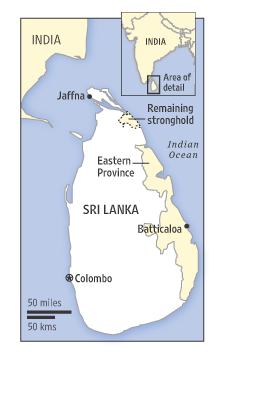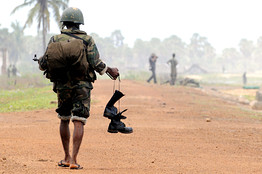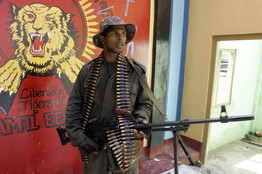Ilankai Tamil Sangam13th Year on the Web Association of Tamils of Sri Lanka in the USA |
||||||||
 Home Home Archive by Date Archive by Date Archive by Category Archive by Category About the Sangam About the Sangam Engage Congress Engage Congress Multimedia Multimedia Links Links Search This Site Search This SiteEditor Not logged in yet Log in (8 unreviewed) |
Sri Lanka Co-Opts Rebels in Peace Bidby Peter Wonacott, The Wall Street Journal, February 2, 2009
BATTICALOA, Sri Lanka -- One of this island nation's best hopes for ending its long civil war is a former Tamil Tiger child soldier, barely 5 feet tall, with the nom de guerre of Pillayan, an endearment meaning "baby." Pillayan is now 33 years old and no longer a rebel. Instead of fighting for a separate state for Sri Lanka's Tamil minority, as the Tamil Tigers have done for a quarter-century, Pillayan is now the chief minister of the country's Eastern Province, backed by the central government. That makes him a critical piece in its strategy to extinguish one of the world's longest-running separatist rebellions and replace it with moderate minority politicians who have local support.
Pillayan's story shows the promise of that road, as the government struggles to craft a lasting peace from the ravages of ethnic strife and terrorism. Yet if he represents the way forward for Sri Lanka, it's likely to be rocky. How this effort plays out is important to stability in the volatile region, with Pakistan and Afghanistan both battling Islamic militants that threaten the South Asian democracies. The U.S. would like to see an inclusive democracy take root in Sri Lanka and has been working quietly with Pillayan's regional administration, extending aid to help the area recover from the aftermath of the December 2004 tsunami. Sri Lanka, the teardrop-shaped island nation off the tip of India, has struggled with the rebellion since the 1970s. The Tamils, a largely Hindu but part-Christian minority of 20% or so, faced discrimination by the Sinhalese, a mostly Buddhist group dominant in government after the island once called Ceylon became independent in 1948. Disaffected Tamil youths formed separatist groups, one of which, the Tamil Tigers, resisted all efforts at pacification. The Sri Lankan armed forces last year deprived the Tigers of most of the territory they controlled and reduced them to a guerrilla band of about 1,500 fighters. The army now is scouring the island's northeastern jungles for the Tiger leader, Velupillai Prabhakaran, seeking to deliver a knockout blow and end a civil war that has taken tens of thousands of lives. In the meantime, at least 120,000 Tamil civilians are trapped in the war zone. The government accuses the Tigers of using them, in effect, as human shields to avert a full-out attack. International humanitarian agencies are calling on the Tigers and the government to allow free movement by the civilians out of the area. On Sunday, shells struck a hospital filled with 500 patients awaiting evacuation, killing at least nine people, a Red Cross spokeswoman said. An Unicef spokesman in Colombo said one of the shells struck a 30-bed pediatric ward, "overcrowded with children." A spokesman for the Sri Lankan army, Brig. V.U.B. Nanayakkara, blamed the strike on the Tamil Tigers. "There are no government troops in the area," he said. "The army knows exactly where this hospital is." Representatives of the Tigers couldn't be reached. The Red Cross is calling for an immediate halt in fighting so the hospital's wounded can be evacuated.
The Eastern Province, the first region wrested from Tiger control, in May saw local elections, after which Pillayan became chief minister. The central government promises a vote in the original Tiger stronghold of northern Sri Lanka as well if it can rout the last of the fighters, who are largely holed up in territory below the northern Jaffna peninsula. Economic development would follow democracy and demilitarization, according to the government plan, placing Pillayan at the center of its strategy to woo local support away from the separatists. Yet Pillayan, whose real name is Sivanesathurai Santhirakanthan, complains openly that the central government hasn't yet extended the promised authority over land, schools and police -- power he says he needs to spur growth and ease ethnic tensions. Meanwhile, he adds, the Tiger movement to which he once belonged has slain scores of former Tigers who, like him, switched sides. Though he has traded his fatigues for a striped blue dress shirt and dark slacks, with which he wears a BMW belt buckle, Pillayan says the likely military defeat of the Tigers hasn't dimmed their aspirations for a separate state in the north. "It will take a long time for the central government to win the hearts of the people there because they have long been subject to repression," he says. Read sections from Peter Wonacott's interview with Sivanesathurai Santhirakanthan. Pillayan's own political party has broken into armed factions, and Tamil residents say they are sometimes roughed up to extract donations. Many Tamil politicians, traditionally sympathetic to the separatist cause, are skeptical of the central government's strategy. Some regard Pillayan as a puppet and say that his political career rests only on the government's wish to deflect criticism for its history of bad treatment of Tamils. "He will be used, and he will be dumped," predicts one Tamil parliamentarian, R. Sampanthan. For Tamils, the grievances go back a long way, to Sri Lanka's independence from British colonial rule. Among their grievances: The majority made Sinhala the official language in the 1950s, putting Tamils at a disadvantage in competition for jobs, and allowed a mass relocation of Sinhalese to traditionally Tamil lands. In the 1970s, the thinking was that "if we want to safeguard Tamils, we would have to take up arms," says Suresh Premachandran, a former separatist fighter who is now in the Sri Lankan Parliament. A killing of 13 soldiers in 1983 set off open warfare between the government and groups seeking a Tamil state, among them the Liberation Tigers of Tamil Eelam. A peace agreement brokered by India in 1987 provided for a degree of Tamil autonomy. The pact brought about a Sri Lankan constitutional amendment calling for provincial councils with power over land and education, when security permitted. The central government pledged to make Tamil, as well as Sinhala, an official national language. The armed forces retreated to their barracks. The rebels agreed to disarm.
Most did, but not the Tigers, who continued to recruit and solicit funds from Tamils abroad. They also began morphing into an unconventional fighting force willing to use terror as a weapon. In 1991, a female Tiger suicide bomber assassinated Indian Prime Minister Rajiv Gandhi, who had supported an Indian peacekeeping force created by the 1987 accord. The U.S. and other Western nations later labeled the Tigers a terrorist organization. Pillayan's story tracks much of this long struggle. He joined the Tigers in 1991 at the age of 16 after two classmates were killed, allegedly by government security forces. The rebels called the diminutive boy "Baby" and sent him for six months of military training in the jungle. He settled into the organization's political wing to promote its separatist cause. Stationed in the eastern part of the country, Pillayan saw little of the main Tiger leader, Mr. Prabhakaran, but admired his passion for the cause and military discipline. Only later, as eastern Tiger leaders began to be killed in interorganization conflicts, did Pillayan's views shift. The violent factionalism finally split the movement. In 2004, the commander of the Tigers in eastern Sri Lanka, with the nom de guerre Col. Karuna Amman, and scores of his followers broke away, forming a separate party and eventually starting to work within the political system. The Tigers in the north targeted the defectors in revenge killings, which took several hundred lives. But the Tigers lost huge swaths of territory they once controlled, and the split turned the tide in the government's favor.
Among those who followed Col. Karuna was Pillayan. "A just struggle turned into a terrorist one," Pillayan says. Working with the central government offered Col. Karuna, Pillayan and others protection. They registered as a political party, known by the initials TMVP. A misstep by Col. Karuna opened the way for Pillayan's rise. Having sent his family to Britain for safety, he entered the U.K. for a visit in late 2007 but on a passport that wasn't his own. Col. Karuna, whose real name is Vinayagamoorthy Muralitharan, says he confessed this "mistake" after he was arrested, and spent months in a British jail before returning to Sri Lanka. But in the meantime, last May, the Eastern Province held its election, and in Col. Karuna's absence Pillayan was chosen as chief minister. The result was a rift between the man who had set the east on its new course and his protégé, Pillayan. Col. Karuna, who professes to have no ambitions for the chief-minister post, says Pillayan is wrong for the job. "They need courageous, intelligent people," he says. Pillayan "can't manage because he has no talent." Pillayan, for his part, contends that Col. Karuna deserted the party during a critical period, disappointing his followers. As chief minister, Pillayan faces mammoth challenges. One of the biggest towns on the east coast, Batticaloa, was hammered by the tsunami. The surrounding area has little industry beyond farming and fishing, leaving it heavily dependent on outside aid. Residents complain that continually having to face security checkpoints stifles trade and deters would-be investors. Pillayan says the central government is handcuffing his development efforts. The province can't collect taxes to raise the revenue that it needs to hire teachers for remote village schools, he says, or to recruit more Tamil police officers to ease animosity toward security forces. "We need to be vested with due powers so as to fulfill the needs of the people," Pillayan says. The central government is appealing for patience. Now that fighting has stopped in the Eastern Province and it has a provincial council in place, plans are taking shape to hand down police and other powers, according to Dew Gunasekara, the minister for constitutional affairs and national integration. The Tamil people "have waited 20 long years," he says. "They can wait a few more months." 
The council Pillayan heads has achieved one success, simply by managing to recruit and retain officials while under a continuing threat of revenge from the remaining Tigers. It also is trying to rebuild local-government headquarters in Batticaloa, destroyed in the years of fighting, and has completed a town hall. But tensions between Pillayan and his former mentor, Col. Karuna, threaten to undermine what progress has been made. Supporters of their factions have begun abducting civilians to hit them up for donations, Tamils say. A shop owner in the village of Siththandy says he was blindfolded, kidnapped and beaten until he agreed to pay about $1,000 to supporters of Col. Karuna. "One faction will order us to do something and the other something else," the 42-year-old shop owner says. "There's no difference between them." Col. Karuna condemns the abductions, saying that that some of his supporters, as former Tigers, haven't fully adapted to life beyond the battlefield. "They grew up handling weapons. Many still have a barbarian's mentality," he says. "They need counseling." Pillayan denies any links to abduction gangs. His spokesman says that Tiger "terrorists" are masquerading as members of Pillayan's political group to tar his administration and disrupt order. Both politicians are surrounded by armed guards. Col. Karuna recently promised to put an end in to the recruitment of underage soldiers in the Eastern Province over the next few months, in an agreement he signed with the Sri Lankan government and Unicef, the United Nations fund that aids children and mothers in developing countries. In December, Unicef estimated the TMVP had 133 child soldiers in its ranks. Pillayan has promised to disarm his party's paramilitary wing once the Tigers are defeated and he gets more authority over the police force that protects him. "When we get the necessary political powers," Pillayan says, "the weapons in our possession will disappear." Write to Peter Wonacott at peter.wonacott@wsj.com Printed in The Wall Street Journal, page A1 |
|||||||
|
||||||||
![[Sivanesathurai Santhirakanthan]](images/HC-GN339_Santhi_BV_20090201164854.gif)
 Though the central government seems on the cusp of military victory, the Tigers have shown they can melt into populated areas and wage rear-guard attacks. In December, even as the Tigers were losing swaths of territory, they mounted a deadly suicide attack just outside the Sri Lanka capital, Colombo.
Though the central government seems on the cusp of military victory, the Tigers have shown they can melt into populated areas and wage rear-guard attacks. In December, even as the Tigers were losing swaths of territory, they mounted a deadly suicide attack just outside the Sri Lanka capital, Colombo.
![[Vinayagamoorthy Muralitharan]](images/HC-GN343_Murali_BV_20090201165010.gif)